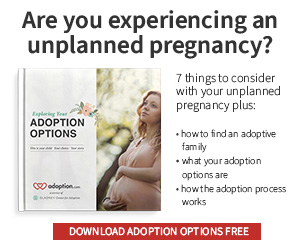With the incredibly important decisions you are faced with, both emotionally and personally, it is often overwhelming to even think about the legal relinquishing process. Even I must admit I had no idea what I was signing. As a pen was put to my hand, I barely saw beyond the cascade of tears seemingly never-ending. In fact, nearly seven years later I still ache to know what my signature looked like across papers that I long to read. Unfortunately, I may never see what it was I signed.
The legal relinquishment process is as simple as it is painful. Yet, because we are consumed with so much else, we trust the process to those in charge and believe we are being taken care of. What nearly every birth mother I know, including myself, wishes upon after the fact is that she knew more about what she did. Knowing more doesn’t necessarily change the process, yet knowing would bring with it peace.
Consider the men who signed the Declaration of Independence. Do you think for a moment that they didn’t know the word for word what they signed? Every important document throughout history is memorized in the hearts and minds of those who created and signed them. So should it be with us birth mothers? Knowing the process and knowing what you sign will help you feel empowered as you go forward. The more informed you are, the greater chance you will have of feeling secure in your choice.
Two very important things transpire after you’ve given birth. The first is the “Petition for Adoption” paperwork you will be asked to sign. Normally you will be asked to sign this either in the hospital or within 3-15 days after delivery. This piece of paper is then sent to the clerk of the court where it begins the adoption process. It is merely stating that you are petitioning to relinquish your child. Once this piece of paper is filed, a court date is set. This is when you will be required to attend a court hearing in which you will go on record agreeing to the relinquishment, and at that time your parental rights to your child will be severed. The amount of time varies between when you sign the petition and when you arrive in court.
One of the greatest myths in the relinquishment process is the amount of time birth parents have in which to change their minds. Only in very rare cases can this actually occur. In most states, once you have been to court and signed the consent to adoption, it is nearly impossible to change your mind. Only if you were forced, under duress, or if any part of the adoption was done illegally, will the courts consider holding a hearing. This still does not mean they will judge in your favor. The most important circumstance is the welfare of your child and what the court finds is best for him or her.
On average, based on each state’s guidelines, a birth mother has anywhere from 72 hours to 90 days to change her mind BEFORE the relinquishment hearing (where her parental rights are severed). Once the hearing has taken place, it becomes an intricate legal process, and statistics show a birth mother is not likely to win. The majority of cases that the public is aware of in which the child was returned to his or her biological parent occurred when one biological parent was not legally given proper notification, or the adoption was finalized or facilitated without meeting state requirements.
Before signing anything be fully aware of this process. If you are not sure of your choice to relinquish, consider placing your child in “cradle care” or taking your baby home. And remember, always ask if you can have a copy of whatever you sign. Depending on which state and county you live in, you may be allowed to receive this.
The original birth certificate that you will be asked to fill out will be submitted to the county, regardless of if you choose to parent or relinquish. You need not amend that document. Give your baby the name you chose and fill out the paperwork to the best of your knowledge. Use your real and full last name, as well as the birth father’s, unless his information is not available. This document will be priceless to your child in the future. Keep in mind, though, the difficulty in attaining a copy of this certificate in the future. Only when your child is an adult and both you and he or she give consent to the court with agreeing on permission will they release it. State regulations on this matter differ.
Pregnant and considering adoption?
Get your free adoption benefits and support bundle

If you do choose to relinquish, a new birth certificate will be issued with the adoptive parent’s names and the name they have chosen for your baby. The original birth certificate, with your information on it, will then be sealed and classified.
With open adoption becoming more widely used, one of the greatest myths is that when you and the adoptive parents agree to an open arrangement, the agreement is legally binding. In only six U.S states are these kinds of agreements acknowledged in a court of law, and even then the ruling factor is what is best for the child. Many adoption agencies are drawing up “Good Faith Contracts,” which state the wishes of both parties and the agreements made. This contract is simply one of good faith. It is a reminder to all of you that you have agreed to certain things. It is not a legally classified document and will not be permissible in a court of law. Do not assume that because you’ve signed an agreement with the adoptive parents that you will have an enforceable contract in which to hold them to.
Are you considering adoption and want to give your child the best life possible? Let us help you find an adoptive family that you love. Visit Adoption.org or call 1-800-ADOPT-98.


